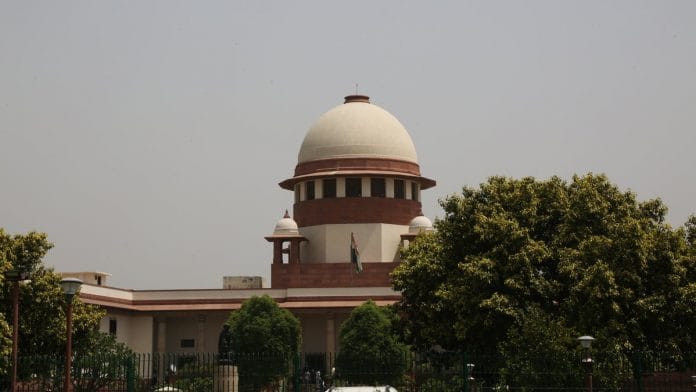New Delhi: The All India Muslim Personal Law Board (AIMPLB) said Saturday it was not satisfied with the Supreme Court judgment on the Ram Janmabhoomi title suit. The board added that it would evaluate legal options, like filing a review petition.
The AIMPLB said it would accept the ruling of the court, even though it did not consider it fair.
“We are yet to discuss the matter within our executive committee, but we might file a review,” Zafaryab Jilani of the Babri Masjid Action Committee said at a press conference.
“Masjid Babar ki nahi hoti. Masjid banne ke baad, woh Allah ki ho jaati hai (a mosque can’t be Babar’s. Once it is constructed, it is Allah’s),” he added. “Hamara Babar se lena dena nahi hai. Hamne toh bola hai ki aapko Babar se problem hai, toh masjid ka naam Ram masjid rakh dijiye (We have nothing to do with Babar. We have said, if you have a problem with Babar, name the mosque after Ram).”
Jilani, however, appealed to people of all communities to maintain peace and not protest against the judgment.
The statement was reiterated by Saadat Ullah Hussaini, president of the Jamaat-e-Islami Hind, an organisation of Muslim scholars and clergy, who was also present at the press conference.
“We are not fully satisfied with the verdict. But we appeal to the entire nation to accept the verdict, and maintain unity and peace,” he said.
“I appeal to Hindus as well as Muslims to help one anotther to maintain peace,” added Fazlur Rahim of AIMPLB, addressing the press meet.
Temple at disputed site
The Supreme Court Saturday ruled that the central government would set up a trust in three months to help build a Ram temple at the disputed 2.77-acre site in Ayodhya. The Muslims, the court said, should be given five acres of land elsewhere in Ayodhya to construct a mosque.
The Sunni Waqf Board would get the alternative plot from either the state or the central government, the court further said.
Jilani, one of the most prominent voices from the Muslim side on the dispute, also said the AIMPLB did not think the judgment was delivered under duress, and the entire country must respect the dignity of the apex court.
However, he said “a mistake” could be committed by anybody, and even the Supreme Court had reviewed its judgments on several occasions in the past.
Jilani said the verdict didn’t signify a victory or defeat for any community, a sentiment also expressed by PM Modi ahead of the verdict.







Tragic day for justice and for India. SC confused and contradictory –
says demolition was a violation of the rule of law and then goes on to reward the people who did it.
The demolition was a criminal act according to the SC
Now the proceeds of the crime the criminals are allowed to keep.
There can be no closure until the people who organised the demolition of the Mosque are brought to justice.
Most of them are likely to do of old age before the trial concludes.
1,045 pages, so there must be fine exposition of fact and law. The bottom line is that a site on which a mosque stood for 450 years will now be handed over to the majority community for construction of a temple. How the site was vacated is known to all. One. cannot judge if an alternate site of five acres of land for construction of a mosque constitutes justice – more than compensation – to Indian Muslims.